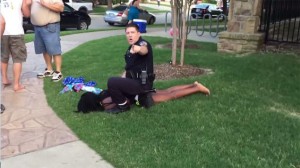Police Criminals & the Brutalization of Black Girls
 Officer Eric Casebolt violently restrains Dajerria Becton. (Brandon Brooks via YouTube)
Officer Eric Casebolt violently restrains Dajerria Becton. (Brandon Brooks via YouTube) In Alice Walker’s short story “The Flowers” a little girl happens upon the decomposing body of a lynching victim while she is out picking flowers. Walker contrasts the light tranquility of the girl’s walk with the savagery of her discovery, suggesting that to be a black child is to never be shielded from the “adult” horrors of racist dehumanization. As the girl lays down her wreath of flowers Walker’s narrator declares: “the summer was over.” Summer’s metaphoric end signifies the brutality of a segregated nation in which black children are already othered, racialized, and criminalized in the pools, parks, and other recreational spaces that define white childhood innocence.
The videotaped assault and sexual harassment of fifteen-year-old Dajerria Becton by a rampaging white police officer after a pool party in McKinney, Texas, makes it clear that it continues to be open season on black women and girls. In the video officer Eric Casebolt grabs, straddles, and violently restrains the young woman while she is lying face down on the ground in a bikini. Ignoring her cries of pain and anxiety, he sadistically sits on her back while handcuffing her. Casebolt then pulls a gun on a few young people who attempt to intervene. Some of the good white citizens of McKinney have reportedly praised Casebolt’s thuggery.
The assault of Becton is an enraging reminder of the brand of sexual terrorism black women routinely experienced in the Jim Crow South at the hands of white law enforcement and ordinary white citizens. In her important book At the Dark End of the Street (2011), Danielle McGuire chronicles how institutionalized sexual violence informed black women’s civil and human rights resistance. Even as they were eclipsed in the mainstream civil rights movement by charismatic black male leaders, black women activists like Ida B. Wells, Recy Taylor, Claudette Colvin, and Endesha Mae Holland drew on their experiences with sexual terrorism to galvanize black women organizers around the nexus of gender, race, and class apartheid.
The McKinney incident underscores how even within the context of “recreation,” “normative” gender boundaries that automatically “feminize” young white women do not exist for young black women. Little black girls can never occupy the space of carefree, feminine innocence that little white girls expect as their birthright. They can never rely on the damsel in distress image to “rescue” them from American-as-apple-pie state violence.
